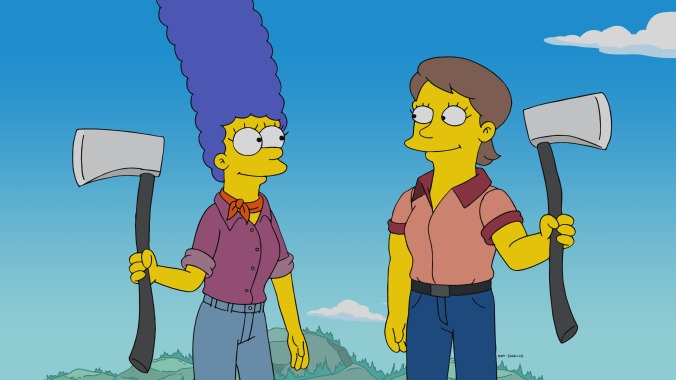It’s not the destination.
When Marge finds herself in the midst of one of her completely justified bouts of self-doubt concerning her life and how she’s viewed by her family and friends, there’s no doubt where the story will end. And that’s fine. A Simpsons episode is a circular monorail trip, its ever-homebound destination a necessity in the show’s apparently never-ending mission to explore the possibilities of the American family sitcom. When Marge—shocked into resentful self-awareness by Lisa’s autobiographical school play about the Simpsons’ home life—latches onto new pal and lumber sports enthusiast Paula and sets off to train in Paula’s home base of Portland, Oregon, it’s with the implicit guarantee that she’ll be back at home at the end of the episode. And, again, that’s fine.
It’s fruitless to point to the scores of episodes that have turned on Marge’s nearly identical character arcs, and not just because the show has been on for so long that that sort of scorekeeping yields big, bold bar-graph results. The Simpsons is about the American family, how roles in that unit change—and how they emphatically do not. Thematic repetition is a problem for the show only when the writers can’t think of something unique, insightful, or plain funny to do with a particular theme. Marge’s role from the very beginning (Season One’s unsteady sea-legs notwithstanding) is that of the traditional suburban housewife and mother, under-appreciated, taken for granted, and stifled as her potentialities and personality are gradually subsumed into her daily routine and ever-lowering expectations.
That there’s more to Marge Simpson, née Bouvier, former “straight-A student and Girl Scout,” as she blurts out in frustration in “Marge The Lumberjill,” is not only a given, it’s central to the Marge we’ve known for 30-plus years. Trapped by an early marriage and some slipshod family planning, the go-getter Marge could have been has made uneasy peace with her role as family stick-in-the-mud, rock, and safe harbor for her ding-dong husband and variously rambunctious kids—except for those episodes where something forces her to confront the limitations her family, society, and self have laid upon her. Here, that means seizing on her unexpected skills with an axe and saw, relishing her new friendship with the lesbian lumberjill (Patty met her at “Burning Woman”) who gives her props for something other than cooking pork chops, and temporarily uprooting her life in order to get in shape for the big, televised lumber sports competition of her newfound dreams.
On The Simpsons, a triumph of the kind that Marge achieves tonight can’t fundamentally change who she is, or her dynamic back in Springfield with her family. But that doesn’t mean that a triumph on The Simpsons is any less a triumph. It just means that the show’s colorful, eventful, animated world is bound by both the unbending necessities of sitcom stasis, and, more interestingly and relevantly, a more profound and resonant adherence to the real world’s more mundanely effortful struggle for satisfaction, and meaning. Marge has felt unappreciated, rebelled, and returned wiser and more self-actualized again and again, only for her gains to seemingly be erased in time for next week’s episode. Again, that’s half beholden to the grind of a lucrative, record-breaking TV run, and half testament to The Simpsons’ ability to mine the same archetypical American family journeys for stories that illuminate its characters in entirely new ways.
Which isn’t to say that “Marge The Lumberjill” falls near the top of the “Marge finds herself” episode heap. (See: “Marge Be Not Proud;” “A Streetcar Named Marge;” “Scenes From The Class Struggle In Springfield;” “Itchy & Scratchy & Marge;” “$pringfield (or, How I Learned to Stop Worrying and Love Legalized Gambling);” “The Twisted World Of Marge Simpson;” your picks in the comments that I’m an idiot for forgetting.) There’s a lack of urgency to Marge’s conflict, which, coupled with how fast the episode moves toward its inevitable return to the status quo, robs the whole journey from Springfield to Portland, and back again of much of its weight. Plus there are a few offhand Marge jokes along the way (Marge tries out ethnic stereotypes in church? Marge happily roasts and eats the adorable chipmunks she and Paula see admiring their woodland efforts?) that are the sort of callously out-of-character gags that only serve to undermine the Marge of it all. (On top of that, how could Lisa, of all people, not have seen how her public depiction of her mother as stereotypical housefrau and chipper dispenser of willfully ignorant optimism would destroy Marge?)
When Marge’s discovery of her wood-chopping prowess (after a fortuitous lightning storm and some prime laziness from Homer) sends her into the shoulder-knot-unkinking hands of the affable Paula, the episode suffers from how innocuously it paints Paula, both as an object of Homer’s misplaced jealousy, and as a potential friend for Marge. Casting non-binary Billions actor Asia Kate Dillon as Paula suggests the show was going to at least introduce some element of romantic conflict for Marge, but Paula remains steadfastly asexual and ultimately irrelevant, shrugging off Marge’s post-victory decision to return to Springfield with hardly a look backward. (She assures Homer she’s happily married to a female Olympian who does that dancing thing, with the ribbons.) Paula repeatedly refers to Marge as “magnificent,” which, of course, Marge is, but the women’s bond never really develops as it needs to.
And as for Homer’s anxiety about Marge’s sudden closeness with a pug-fostering, Portland-based, Bryn Mawr grad and outdoorsy type, it’s refreshing enough, I suppose, that Homer’s historically wavering relationship with the LGBTQI community is portrayed as essentially neutral-to-accepting here, but that doesn’t leave much drama for Ryan Koh’s script to work with. Marge’s dissatisfaction doesn’t even really center on Homer (his one-whack efforts at tree-clearing notwithstanding), so the other standby Simpsons theme of “Homer becomes a better husband” gets tossed off with a few nice platitudes. (He has, indeed, been a “lumber-jerk,” but not a big one, as far as these things go.)
It all leaves the amiable “Marge The Lumberjill” feeling awfully inessential, especially since it isn’t packed with compensatory great jokes. Portlandia (whose theme is hijacked once the Simpsons hit Portland) has done all these Portland gags better, although “If Woody Harrelson was a city” is a fine motto. And there’s a lovely little present for quick-eared fans of quirky bisexual singer-songwriter Jill Sobule (of the superior “I Kissed A Girl” song), who sings the original Marge training montage anthem “The Lumberjill Song.” (“Vroom, vroom, pull the cord”) after she’s name-checked as the newly Portland-ized Marge’s fashion icon. It’s sweet, even if its playful depiction of Marge’s inner awakening feels more invested than the episode as a whole ends up being.
Stray observations
- Bart’s introduction to the woods is informed by his corporate propaganda school texts that blame trees for global warming. (Introduction by Mitch McConnell.)
- I don’t know what to do with this joke. Homer, offering Paula and her wife some sperm, is told that sperm and semen are the same thing. “They are?,” he answers, “Uh-oh.” I think it’s just odd Homer logic, and that’s how I’m choosing to enjoy it.
- Lisa’s play (Long Day’s Journey Into Light Beer) sees the Bart character bemoaning that his catchphrases are as outdated as his slingshot, and the Homer character offhandedly explaining how he recently wanted to become a race car driver, became a race care driver, and then quit being a race car driver. We get it. Been on a long time.
- The opening credits gag cites the Krusty The Clown Show as the only show not migrating to new Simpsons’ home Disney+. Followed later in the episode for a commercial for Disney+.
- The Simpsons keeps trying to make sportscaster and Stephen A. Smith clone Anger Watkins a thing. I like Kevin Michael Richardson’s voice for the character just fine, but presenting his network demotion to lumber sports here as a result of him “snapping a PA’s bra strap” isn’t especially endearing.


 Keep scrolling for more great stories.
Keep scrolling for more great stories.
